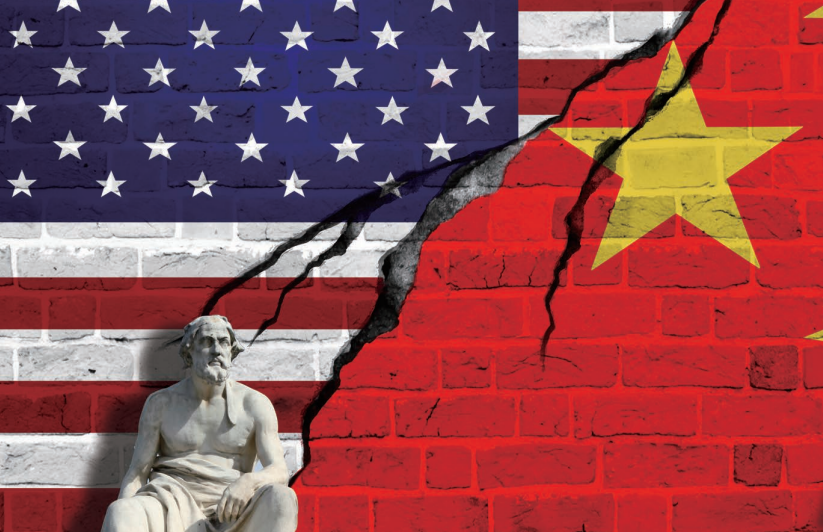Zhong Yin, Research Professor, Research Institute of Global Chinese and Area Studies, Beijing Language and Culture University
Oct 20, 2022
There are many imperfections and contradictions in the latest NSS. It’s hard enough to promote fairness and justice in the world, so how does one balance a strategy that puts U.S. interests and the well-being of Americans ahead of everyone else?
Sun Chenghao, Fellow, Center for International Security and Strategy of Tsinghua University; Munich Young Leader 2025
Zhang Ding, Assistant Research Fellow, D&C Think Tank
Oct 20, 2022
The new U.S. National Security Strategy report reflects a certain anxiety within the Biden administration, which has not evolved materially beyond Trump. The strategy neither advances global peace nor prevents China-U.S. relations from sliding into confrontation.
Yu Hongjun, Senior Research Fellow, Academy of Contemporary China and World Studies
Oct 20, 2022
In turbulent times, China remains steadfastly committed to its path of peaceful development. The words of President Xi Jinping and State Councilor and Foreign Minister Wang Yi are worthy of thoughtful study.
Joseph Vaughan, Masters Student, Johns Hopkins University School of Advanced International Studies
Justin Feng, Masters Student, Johns Hopkins School of Advanced International Studies
Oct 14, 2022
Export controls are central in economic competition between the U.S. and China. A new U.S.-led multilateral export control regime could further entrench efforts to exclude China from accessing Western technology.
Zhou Xiaoming, Former Deputy Permanent Representative of China’s Mission to the UN Office in Geneva
Oct 12, 2022
An anti-development drive by the United States aims to undercut China in the Solomon Islands and elsewhere. Washington portrays China as a bad actor, sows discord and sets up exclusive trading blocs in a geopolitical tsunami designed to maintain U.S. dominance.
Dong Chunling, Deputy Director, Office of the Center for the Study of a Holistic View of National Security, CICIR
Oct 03, 2022
The U.S. strategic community’s assessment of America’s China policy can make a major difference in bilateral relations. Crises have a double edge: They provide challenges but also opportunities. Whether or not U.S. leaders will listen to the experts remains an open question.
Doug Bandow, Senior Fellow, Cato Institute
Sep 30, 2022
The Russo-Ukraine conflict has raged on and looks to continue into the near future, straining relations in Europe. The ripple effects of military conflict involving a pronounced foe of the United States has created an even more tense climate on a global stage that already sees U.S.-China relations declining at an alarming rate.
Brian Wong, Assistant Professor in Philosophy and Fellow at Centre on Contemporary China and the World, HKU and Rhodes Scholar
Sep 30, 2022
U.S. and Chinese officials have grown accustomed to barbed exchanges in the public forum. It would seem that the minds of the two nations are diverging to opposing extremes. While a U.S.-China schism is undeniable, the world of academia is operating at a different wavelength than their government counterparts.

Zhu Feng, Dean of School of International Studies, Nanjing University
Sep 30, 2022
Major-country relations are changing dramatically. Chinese academics and political leaders should conduct an in-depth analysis of what China faces. The United States has already started a new Cold War in regional and global industrial chains.
Zhou Xiaoming, Former Deputy Permanent Representative of China’s Mission to the UN Office in Geneva
Sep 27, 2022
Washington’s initiatives are being pitched as an “alternative to China,” as they divide developing countries and solidify U.S. control. The IPEF may compete with ASEAN, raising questions about the bloc’s centrality.
Back to Top

- China-US Focus builds trust and understanding between the U.S. and China through open dialogue among thought leaders.
- Our Offerings
- Topics
- Videos
- Podcasts
- Columnists
- Research Reports
- Focus Digest
- Stay Connected
-
Thanks for signing up!
- Get the latest stories from China-US Focus weekly.